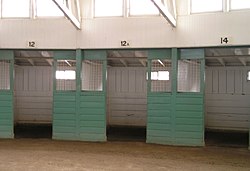Triskaidekaphobia
From Wikipedia, the free encyclopedia
| This section may require cleanup to meet Wikipedia's quality standards. |
| This article needs additional citations for verification. Please help improve this article by adding reliable references (ideally, using inline citations). Unsourced material may be challenged and removed. (October 2008) |

Triskaidekaphobia (from Greek tris=three, kai=and, deka=ten) is fear of the number 13; it is a superstition and related to a specific fear of Friday the 13th, called paraskevidekatriaphobia or friggatriskaidekaphobia.
Contents |
[edit] Origins
There is a common myth that the earliest reference to thirteen being unlucky or evil is from the Babylonian Code of Hammurabi (circa 1780 BC), where the thirteenth law is omitted. In fact, the original Code of Hammurabi has no numeration. The translation by L.W. King (1910) edited by Richard Hooker has omitted one article:
If the seller have gone to (his) fate (i. e., have died), the purchaser shall recover damages in said case fivefold from the estate of the seller.
Other translations of the Code of Hammurabi, i.e. the translation by Robert Francis Harper, contain the 13th article. [1]
Some Christian traditions have it that at the Last Supper, Judas, the disciple who betrayed Jesus, was the 13th to sit at the table[2] and that for this reason 13 is considered to carry a curse of sorts.[citation needed] However, the number 13 is not uniformly bad in the Judeo-Christian tradition. For example, the 13 attributes of God (also called the thirteen attributes of mercy) are enumerated in the Torah (Exodus 34: 6-7).[3] Some modern Christian churches also use 13 attributes of God in sermons.[4]
Triskaidekaphobia may have also affected the Vikings—it is believed that Loki in the Norse pantheon was the 13th god[citation needed]. More specifically, Loki was believed to have engineered the murder of Baldr, and was the 13th guest to arrive at the funeral. This is perhaps related to the superstition that if thirteen people gather, one of them will die in the following year. Another Norse tradition involves the myth of Norna-Gest: when the uninvited norns showed up at his birthday celebration—thus increasing the number of guests from ten to thirteen— the norns cursed the infant by magically binding his lifespan to that of a mystic candle they presented to him.
Ancient Persians believed the twelve constellations in the Zodiac controlled the months of the year, and each ruled the earth for a thousand years at the end of which the sky and earth collapsed in chaos. Therefore, the thirteenth is identified with chaos and the reason Persian leave their houses to avoid bad luck on the thirteenth day of the Persian Calendar (a tradition called Sizdah Bedar).
In 1881, an influential group of New Yorkers led by U.S. Civil War veteran Captain William Fowler came together to put an end to this and other superstitions. They formed a dinner cabaret club, which they called the Thirteen Club. At the first meeting, on Friday 13 January 1881 at 8:13 p.m., 13 people sat down to dine in room 13 of the venue. The guests walked under a ladder to enter the room and were seated among piles of spilled salt. All of the guests survived. Thirteen Clubs sprang up all over North America for the next 40 years. Their activities were regularly reported in leading newspapers, and their numbers included five future U.S. presidents, from Chester A. Arthur to Theodore Roosevelt. Thirteen Clubs had various imitators, but they all gradually faded from interest as people became less superstitious.[5]
[edit] Similar phobias

- Tetraphobia, fear of the number 4 — (phonetically similar to 'death') in Korea, China, and Japan, as well as in many East-Asian and some Southeast-Asian countries, it's not uncommon for buildings (including offices, apartments, hotels) to lack floors with the number 4, and Finnish mobile phone manufacturer Nokia's 1xxx-9xxx series of mobile phones does not include any model numbers beginning with a 4. In Taiwan, tetraphobia is so common that there are no 4's or x4's for hospitals.
- 17 is Italy's unlucky number, because in Roman digits 17 is written XVII, that could be rearranged to "VIXI", which in Latin means literally "I have lived" but can be a euphemism for "I am dead".[citation needed]
- Paraskavedekatriaphobia is the fear of Friday the 13th, which is considered to be a day of bad luck in a number of western cultures. In Romanian, Greek and Hispanic cultures, Tuesday the 13th is considered unlucky.
[edit] References
- ^ http://oll.libertyfund.org/index.php?option=com_staticxt&staticfile=show.php%3Ftitle=1276&Itemid=27 Complete scientific Englsh translation of the Code of Hammurabi
- ^ http://www.straightdope.com/columns/read/670/why-is-the-number-13-considered-unlucky
- ^ 13 attributes of mercy Retrieved 13 July, 2007.
- ^ alex snider Faith Presbyterian Church Retrieved 13 Julygfhd, 2007.
- ^ Nick Leys, If you bought this, you've already had bad luck, review of Nathaniel Lachenmayer's Thirteen: The World's Most Popular Superstition, Weekend Australian, 8-9 January 2005
- Lachenmeyer, Nathaniel (2004). 13: The Story of the World's Most Popular Superstition. New York: ISBN 1-56858-306-0.
- Havil, Julian (2007). Nonplussed: Mathematical Proof of Implausible Ideas (Hardcover). Princeton University Press. pp. 152. ISBN 0691120560.
- O'Neil, Daniel (2008). "Fear of 13: Tales over dinner."
[edit] External links
| Wikimedia Commons has media related to: Triskaidekaphobia |
- 'Unlucky' airline logo grounded BBC, 21 February 2007
- Would you buy a number 13 house? BBC Magazine, Friday, 12 December 2008
- Triskaidekaphobia on MathWorld
- Who's Afraid Of Friday The 13th? on NPR

